- Home
- Tom Stoppard
Hapgood
Hapgood Read online
Praise for Hapgood
“Hapgood is an onion-like construction: the author peels back a layer of threats, uncertainties, possible betrayals only to reveal another … [Stoppard is] a rare bird.”
—Time
“[Stoppard] has been called cerebral, but his mind is a cogitating heart; it lusts for ideas … Written during the endgame of the cold war, the play is a theatrical cyclotron into which Stoppard tosses his colliding human atoms … On the surface the play is a le Carré-like thriller … [Stoppard is] a marvelous entertainer … [A] metaphysical fun house.”
—Newsweek
“Few playwrights entertain as many ideas and make so many ideas entertaining as Tom Stoppard … [Hapgood] is hugely entertaining and often quite moving.”
—Variety
“Vastly entertaining.”
—Jewish Chronicle
“Stoppard’s most cunning play yet.”
—Guardian
“Best to submit to the unique Stoppardian experience, be carried long by this clever and theatrically playful spymaster—and savor the wit and wordplay … and the fact that, in the end, everything makes perfect emotional sense.”
—Daily Mail
“A plot of fiendish ingenuity.”
—Independent
“Consciously nostalgic for an era in British intelligence in which spymasters had bakelite telephones on their desk, spoke to each other by radio and in which the Cold War offered up a relatively simple paradigm of them and us … a frequently gripping piece about the multifaceted interplay between perception and deception that also slips in a sly tug on the emotions just when you least expect it.”
—Telegraph (UK)
“The play is itself a double agent … completely joyous … unparalleled verbal dexterity … a rollicking spy story to boot.”
—TimeOut (UK)
Also by Tom Stoppard
PLAYS
The Hard Problem
Enter a Free Man
The Real Inspector Hound
After Magritte
Jumpers
Travesties
Dirty Linen and New-Found-Land
Every Good Boy Deserves Favour
Night and Day
Dogg’s Hamlet and Cahoot’s Macbeth
Undiscovered Country
(adapted from Arthur Schnitzler’s Das weite Land)
On the Razzle
(adapted from Johann Nestroy’s Einen Jux will er sich machen)
Arcadia
The Real Thing
Rough Crossing
(adapted from Ferenc Molnár’s Play at the Castle)
Dalliance
(adapted from Arthur Schnitzler’s Liebelei)
Indian Ink
Rosencrantz & Guildenstern Are Dead
The Invention of Love
The Coast of Utopia: A Trilogy
Voyage: The Coast of Utopia Part I
Shipwreck: The Coast of Utopia Part II
Salvage: The Coast of Utopia Part III
Rock ’n’ Roll
TELEVISION SCRIPTS
A Separate Peace
Teeth
Another Moon Called Earth
Neutral Ground
Professional Foul
Squaring the Circle
Parade’s End
FICTION
Lord Malquist & Mr. Moon
TOM STOPPARD
HAPGOOD
Copyright © 1988, 1994, 2015 by Tom Stoppard
All rights reserved. No part of this book may be reproduced in any form or by any electronic or mechanical means, including information storage and retrieval systems, without permission in writing from the publisher, except by a reviewer, who may quote brief passages in a review. Scanning, uploading, and electronic distribution of this book or the facilitation of such without the permission of the publisher is prohibited. Please purchase only authorized electronic editions, and do not participate in or encourage electronic piracy of copyrighted materials. Your support of the author’s rights is appreciated. Any member of educational institutions wishing to photocopy part or all of the work for classroom use, or anthology, should send inquiries to Grove Atlantic, 154 West 14th Street, New York, NY 10011 or [email protected].
CAUTION: Professionals and amateurs are hereby warned that Hapgood is subject to a royalty. It is fully protected under the copyright laws of the United States, Canada, United Kingdom, and all British Commonwealth countries, and all countries covered by the International Copyright Union, the Pan-American Copyright Convention, and the Universal Copyright Convention. All rights, including professional, amateur, motion picture, recitation, public reading, radio broadcasting, television, video or sound taping, all other forms of mechanical or electronic reproduction, such as information storage and retrieval systems and photocopying, and rights of translation into foreign languages, are strictly reserved.
First-class professional, stock, and amateur applications for permission to perform it, and those other rights stated above, must be made in advance to Samuel French, Inc., 235 Park Avenue South, New York, NY 10003, and for professional rights, to United Agents LLP, 12–26 Lexington Street, London, W1F 0LE.
First published in 1988 by Faber and Faber Limited
Printed in the United States of America
First Grove Atlantic paperback edition: May 2018
Library of Congress Cataloging-in-Publication Data is available for this title.
ISBN 978-0-8021-2834-8
eISBN 978-0-8021-4621-2
Grove Press
an imprint of Grove Atlantic
154 West 14th Street
New York, NY 10011
Distributed by Publishers Group West
groveatlantic.com
18 19 20 21 10 9 8 7 6 5 4 3 2 1
For Oliver with love and thanks
PRODUCTION CREDITS
Hapgood was presented by Michael Codron at the Aldwych Theatre, London, on 8 March 1988.
The cast was as follows:
Hapgood Felicity Kendal
Blair Nigel Hawthorne
Kerner Roger Rees
Ridley Iain Glen
Wates Al Matthews
Merryweather Adam Norton
Maggs Roger Gartland
Joe Christopher Price or
Andrew Read
Russian Patrick Gordon
Directed by Peter Wood
Designed by Carl Toms
Lighting by David Hersey
Hapgood opened in New York on 11 November 1994 at the Mitzi E. Newhouse Theater.
The cast was as follows:
Hapgood Stockard Channing
Blair Josef Sommer
Kerner David Strathairn
Ridley David Lansbury
Wates Clifton Davis
Merryweather Brían F. O’Byrne
Maggs Michael Winther
Joe Yaniv Segal
Russian Boris McGiver
Directed by Jack O’Brien
Set design by Bob Crowley
Costume design by Ann Roth
Lighting by Beverly Emmons
Sound by Scott Lehrer
A revival of Hapgood opened in London on 4 December 2015 at the Hampstead Theatre.
The cast was as follows:
Hapgood Lisa Dillon
Blair Tim McMullan
Kerner Alec Newman
Ridley Gerald Kyd
Wates Gary Beadle
Merryweather Edward Hancock
Maggs Nick Blakeley
Joe Adam Cansfield / Sasha Gray
Russian Joe Evans
Directed by Howard Davies
Designed by Ashley Martin Davis
Lighting by James Farncombe
Sound by Mike Walker
Composed by Dominic Muldowney
&
nbsp; Casting by Juliet Horsely
CHARACTERS
Hapgood aged thirty-eight
Blair probably twenty years older, but in good shape
Kerner forty-ish
Ridley mid-thirties
Wates either side of forty-five
Maggs twenties
Merryweather twenty-two
Joe eleven
Russian any age, thirty to fifty
Table of Contents
Cover
Praise for Hapgood
Also by Tom Stoppard
Title Page
Copyright
Dedication
Production Credits
Characters
ACT ONE
Scene I The Pool, Wednesday morning
Scene 2 The Zoo, Wednesday noon
Scene 3 The Rugby Pitch, Wednesday afternoon
Scene 4 The Office, Thursday morning
Scene 5 The Shooting Range, Thursday afternoon
ACT TWO
Scene I The Office, Thursday evening
Scene 2 The Studio, Friday morning
Scene 3 The Zoo, Friday noon
Scene 4 The Office, Friday afternoon
Scene 5 The Hotel, Friday evening
Scene 6 The Pool, Friday night
Scene 7 The Rugby Pitch, Saturday afternoon
Back Cover
ACT ONE
SCENE I
We are looking at part of the men’s changing room of an old-fashioned municipal swimming-baths. It is ten o’clock in the morning. The cubicles are numbered, and they have doors which conceal occupancy although they don’t meet the ground. There is a wash-basin or two, a place to shave facing front. Four of the cubicles have to ‘work’. There are four ways of coming and going: ‘Lobby’, ‘Pool’, ‘Showers’, and, for the sake of argument, ‘Upstage’.
The lobby doors have MEN in reverse on the glass. Signs saying POOLS, SHOWERS, GENTS, and EXIT may be used.
One of the showers is evidently in use—we can hear it. When we encounter this scene, WATES is shaving. He is a black man, an American, who is normally impressively tailored and suave but at present is dressed in cast-offs and looks as if he spent last night on a park bench. His tackle is basic—shaving brush, shaving stick, old-fashioned safety razor.
Before anything else happens we have a short radio play. What we can hear is two people (a man and a woman, HAPGOOD) talking to each other on shortwave radio. The voices have a slight distort.
RADIO OK, we have a blue Peugeot … stopping.
Single male.
It’s not Georgi.
Anybody know him? No briefcase, repeat negative on briefcase.
Are you getting this, Mother?—we have the Peugeot but it’s not Georgi.
He’s crossing the road. Fancy tracksuit, running shoes. No sign of the follower. Are you getting this?—target is approaching, negative on Georgi, negative on briefcase, negative on follower, give me a colour.
HAPGOOD (On radio) Green. You should be seeing Kerner.
RADIO Negative. They changed the plot. Confirm Green.
HAPGOOD (On radio) Green. Tell me when Kerner shows.
WATES (Live) If he shows.
HAPGOOD (On radio) Tell me when Kerner shows, he’ll be walking.
WATES (Live, no emotion) Kerner is thirty thousand feet up on Aeroflot, I feel sick.
RADIO Who is that?
HAPGOOD (On radio) Wates—just shave.
WATES (Live) Yes, ma’am.
RADIO Target inside. Negative on Kerner. Target in lobby. Ridley has seen him. Still negative on Kerner. Do I hear yellow? Mother, give me a colour, we’re still—OK, we have a walker.
OK, we have Kerner … three hundred yards … affirmative on briefcase.
Target’s got his key.
HAPGOOD (On radio) Say when.
RADIO Four—three—two— (The lobby door opens.) You’re looking at him.
A man enters from the lobby. He wears a colourful tracksuit and running shoes. He carries a towel rolled up into a sausage, we assume the swimming trunks and cap are inside. He carries a key on a loop of string which might make it convenient to wear as a pendant. He is otherwise empty-handed. We call this man RUSSIAN ONE, because he is Russian and because there are going to be two of them.
Russian One enters Cubicle One. (This numbering has nothing to do with the actual numbers on the cubicles, it is only for our convenience.) Russian One enters his cubicle and closes the door behind him.
RIDLEY enters from the lobby. He is carrying a briefcase (but the briefcase may be inside a sports holdall). Ridley now goes on a perambulation. The essence of the situation is that Ridley moves around and through, in view and out of view, demonstrating that the place as a whole is variously circumnavigable in a way which will later recall, if not replicate, the problem of the bridges of Konigsberg (and which will give Russian One time to undress). Back to the plot. Russian One, dressed to swim, leaves his cubicle, locks it, swings his towel up and over the lintel and leaves it hanging there, and goes off to the pool. When he has gone Ridley posts his briefcase under the door of Cubicle One, and pulls the towel off the door. (As a matter of interest, the Ridley who posts the briefcase is not the same Ridley who entered with it.) Ridley enters Cubicle Two and closes the door behind him. The towel appears, flung over the lintel, hanging down. Wates continues to shave. The shower continues to run. KERNER enters from the lobby. He carries a briefcase. He has a towel and a key. He looks around and posts his briefcase under the door with the towel showing (Cubicle Two). Kerner pulls the towel off the door and tosses it over the door into the cubicle. Kerner enters another cubicle (Cubicle Three) and closes the door behind him. A moment later his towel appears over the lintel. Ridley leaves Cubicle Two, bringing Kerner’s briefcase with him, and also the towel. He chucks the towel over the door of Cubicle One. With the briefcase he disappears in the direction of the showers. The shower cubicle may be in full view, in which case we see Ridley delivering his briefcase to the occupant.
Russian One leaves the pool, wet of course, and re-enters his cubicle.
Ridley comes back into view, from the showers, without the briefcase. He goes to the pool.
RUSSIAN TWO enters from the lobby. He is the twin of Russian One, and dressed like Russian One. He carries a similar rolled-up towel. However, he also carries a briefcase. He glances round briefly, and notes the towel on Kerner’s door (Cubicle Three). He posts his briefcase under Kerner’s door. He enters a cubicle, Cubicle Four.
MERRYWEATHER, a boyish twenty-two-year-old in sports jacket and flannels, enters from the lobby. His manner is not as well calculated as Ridley’s had been. He is at first relieved and then immediately disconcerted by the absence of Russians.
Russian One, now dressed, leaves his cubicle, carrying his rolled-up towel but leaving the briefcase (which Ridley posted) behind. Russian One leaves to the lobby.
Merryweather, whose idea of making himself inconspicuous has been, perhaps, to examine himself in Wates’s mirror, follows Russian One out to the lobby.
Kerner, dressed, leaves Cubicle Three, with the briefcase which had been posted there, and leaves to the lobby.
Russian Two reappears, from Cubicle Four, and enters Cubicle One to collect the briefcase which had been posted there by Ridley. As he leaves the cubicle, Ridley re-enters from the pool.
Russian Two leaves to the lobby. Ridley follows him out. Wates has finished shaving. He is packing up his shaving tackle. The shower stops running. There is a pause, and then the occupant of the shower, Hapgood, approaches, somewhat encumbered by a briefcase (Kerner’s original), a leather rectangular clutch handbag with a shoulder strap, and an umbrella which she is at the moment taking down and shaking out. From her appearance, the umbrella has been an entire success. She comes down into the light and leans the umbrella carefully against the cubicles, and stands pensively for a moment. She is apparently too preoccupied to acknowledge Wates, who is himself preoccupied with something which makes him s
hake with silent laughter. He is putting a heavy steel wrist-watch on his right wrist. (Note: All the foregoing action may be done to music and lightly choreographed.)
WATES Young guy in a sports coat, college haircut, nasty wart on the back of his right hand, no, left, it was in the mirror.
HAPGOOD Merryweather.
WATES Merryweather, right. Followed the man in, followed the wrong man out, meanwhile Merryweather’s man turns around and leaves with the goods. Sort of dummy.
HAPGOOD Yes, he is rather.
The lobby doors open. Ridley enters in a somewhat excited, even delighted, state.
RIDLEY (Greeting her) Mother.
HAPGOOD This is Ridley.
RIDLEY You didn’t tell me it was twins.
HAPGOOD This is Wates.
Hapgood puts the briefcase on the ground, then lays it flat. She undoes the catches and raises the lid. During this Wates and Ridley shake hands.
WATES Ben Wates.
RIDLEY (Friendly) Ridley.
Hapgood has stood up, taking from the case a flat white cardboard box, a few inches square, the sort of thing that might contain a computer disc, which is what in fact it does contain. However, she is not the slightest interested in the box. She stands staring down at the open briefcase.
HAPGOOD (Bad news) Wates.
Now Wates looks at her and at the briefcase.
WATES Oh, Lord.
HAPGOOD Where’s yours, Ridley?
RIDLEY In the Peugeot.
Merryweather returns, looking sheepish. Hapgood tosses the disc-box back into the briefcase.
MERRYWEATHER Sorry, Mother—I—
HAPGOOD Where did he go, Merryweather?
MERRYWEATHER Actually, I lost him—a taxi came round the corner—
HAPGOOD He’s in the taxi?
Merryweather nods.
RIDLEY (To Hapgood) Chamberlain’s cab, I love it. Listen, how the hell—
HAPGOOD (Politely) Be quiet, Ridley.
She is opening her handbag and taking out a small radio transmitter/receiver.
These gadgets are going to get quite a lot of use and evidently the state of the art has arrived at a radio which is no larger and somewhat slimmer than twenty cigarettes. The radio speaks quietly.

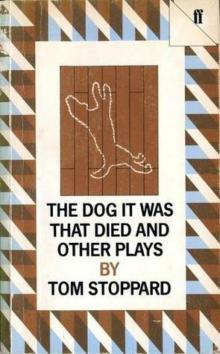 The Dog It Was That Died and Other Plays
The Dog It Was That Died and Other Plays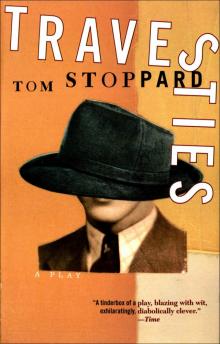 Travesties
Travesties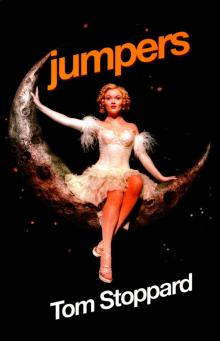 Jumpers
Jumpers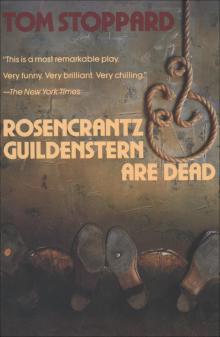 Rosencrantz and Guildenstern Are Dead
Rosencrantz and Guildenstern Are Dead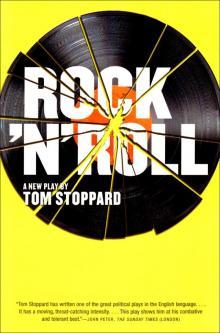 Rock 'N' Roll
Rock 'N' Roll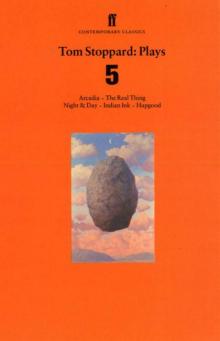 Plays 5
Plays 5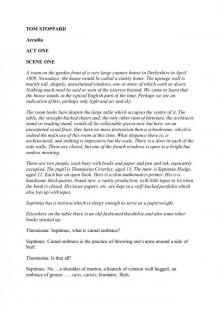 Arcadia
Arcadia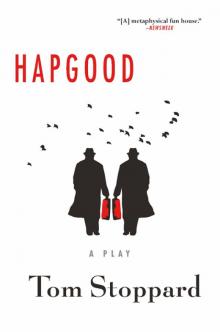 Hapgood
Hapgood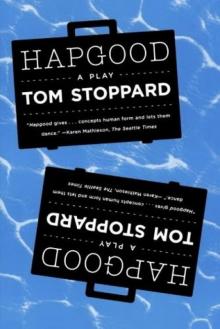 Hapgood: A Play
Hapgood: A Play Every Good Boy Deserves Favor & Professional Foul
Every Good Boy Deserves Favor & Professional Foul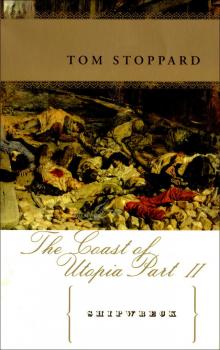 The Coast of Utopia: Voyage, Shipwreck, Salvage
The Coast of Utopia: Voyage, Shipwreck, Salvage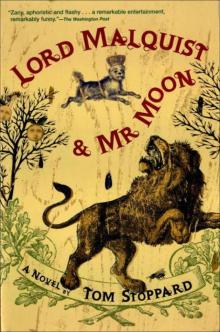 Lord Malquist & Mr. Moon
Lord Malquist & Mr. Moon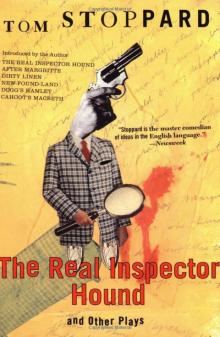 The Real Inspector Hound and Other Plays
The Real Inspector Hound and Other Plays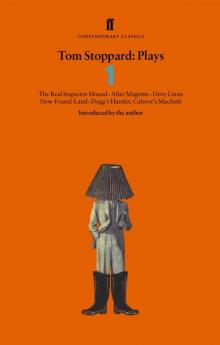 Tom Stoppard Plays 1
Tom Stoppard Plays 1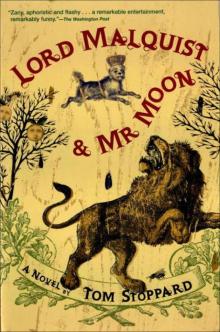 Lord Malquist & Mr. Moon: A Novel
Lord Malquist & Mr. Moon: A Novel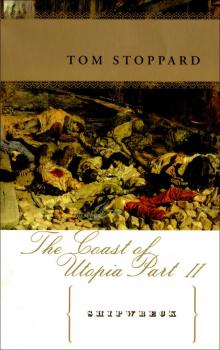 Shipwreck
Shipwreck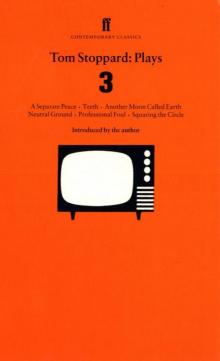 Tom Stoppard Plays 3
Tom Stoppard Plays 3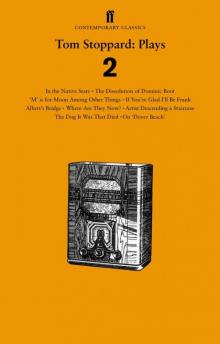 Tom Stoppard Plays 2
Tom Stoppard Plays 2 Rosencrantz and Guildenstern are dead. Arcadia
Rosencrantz and Guildenstern are dead. Arcadia